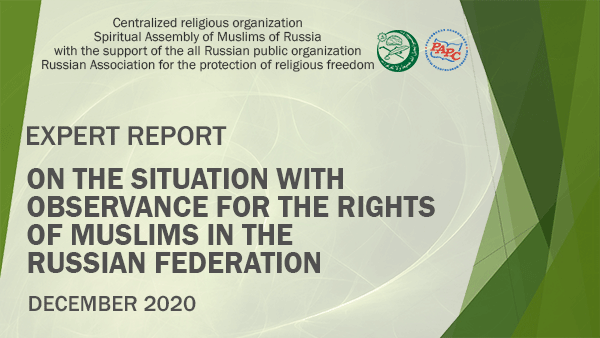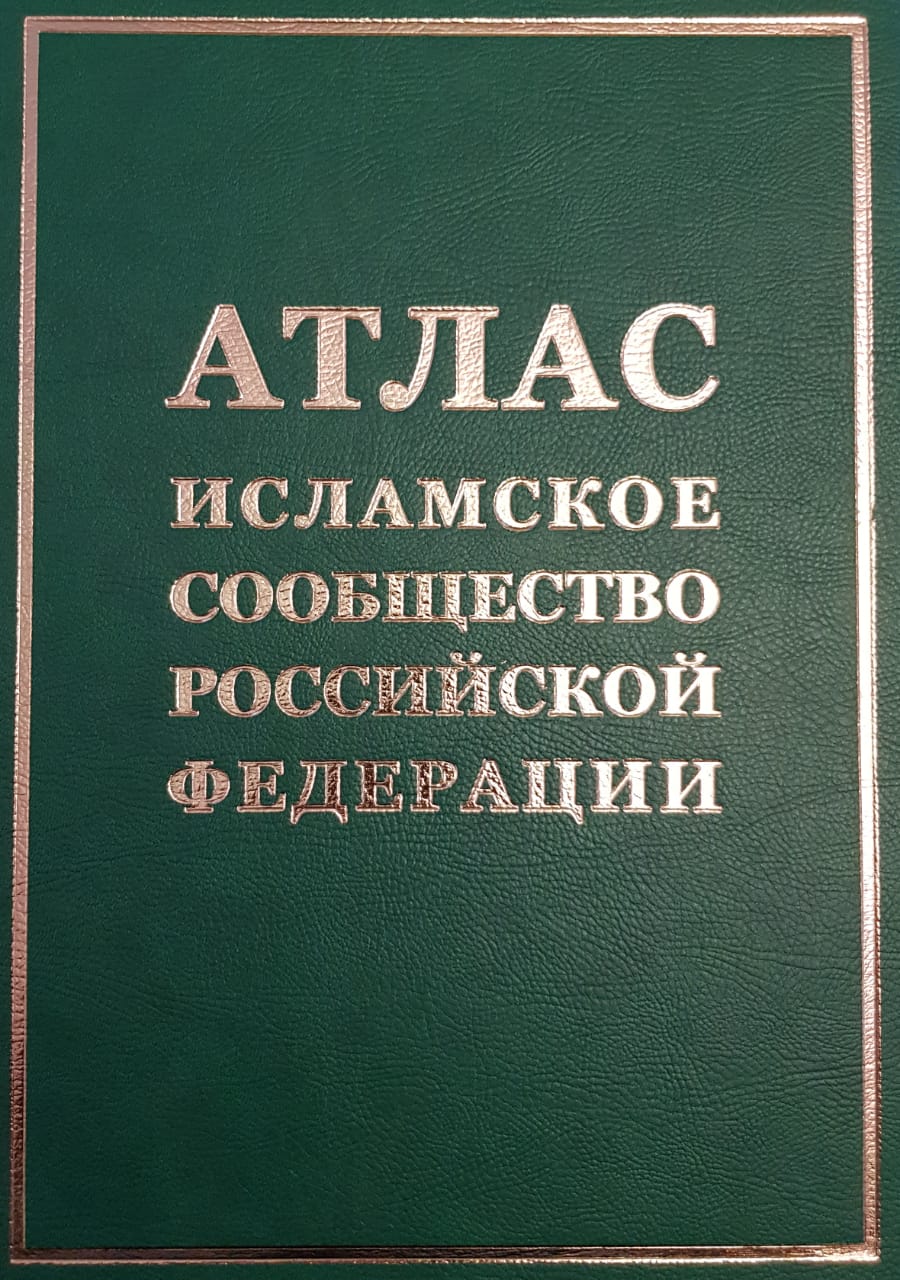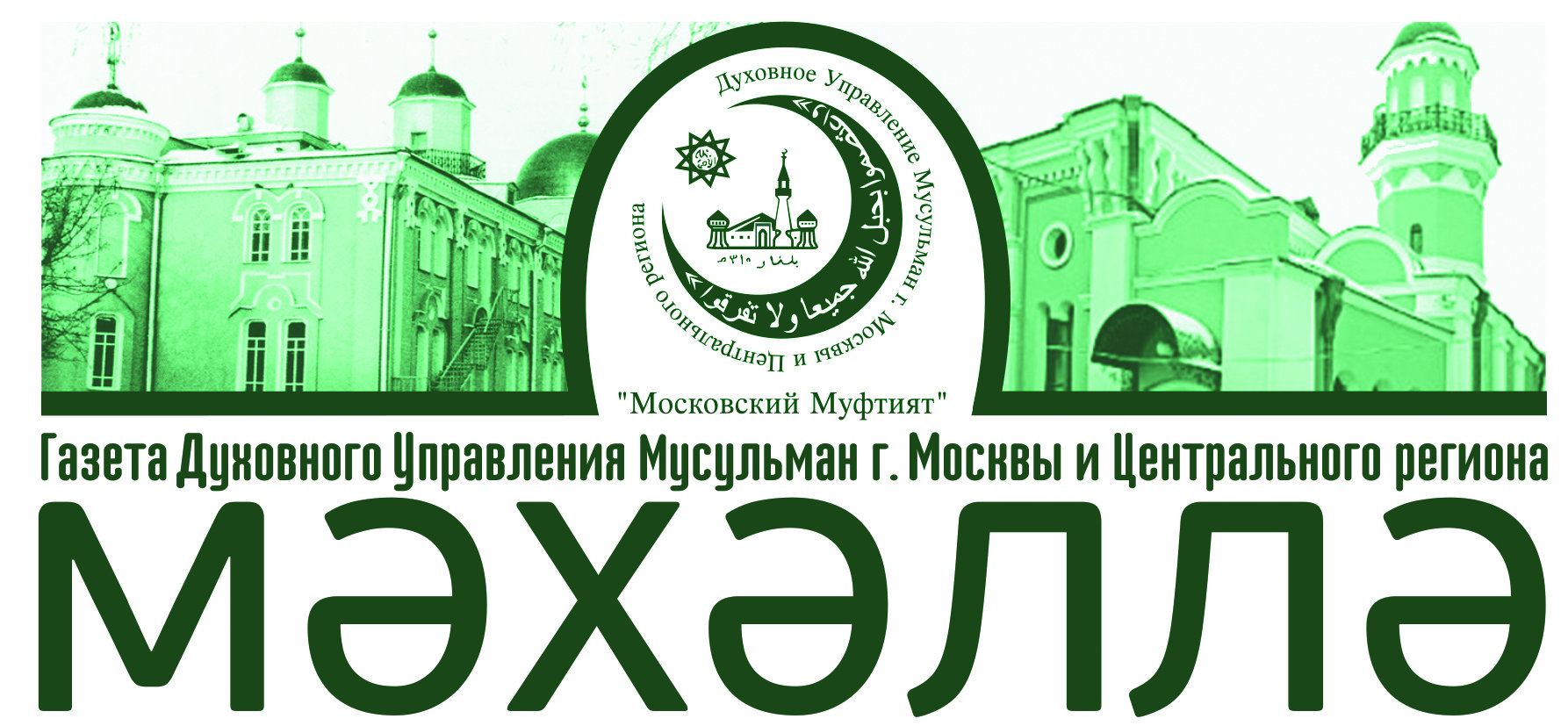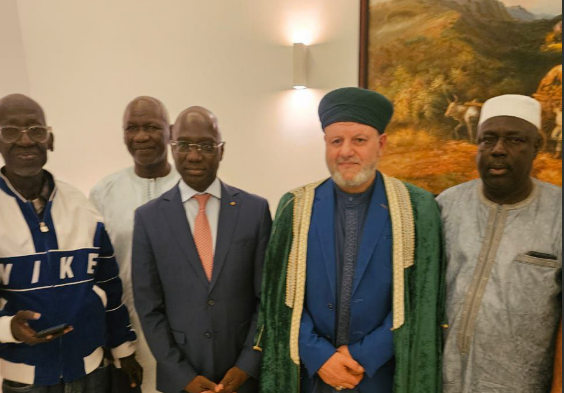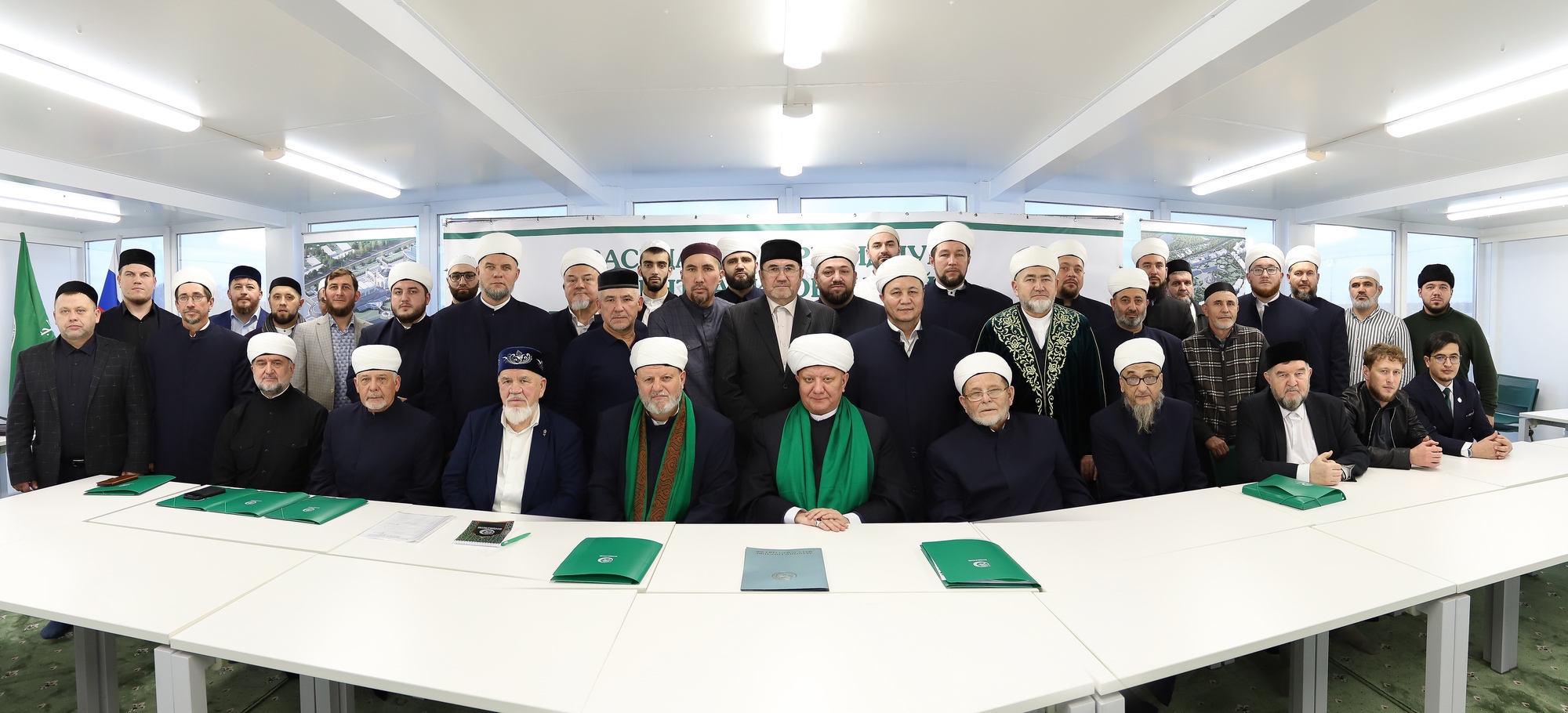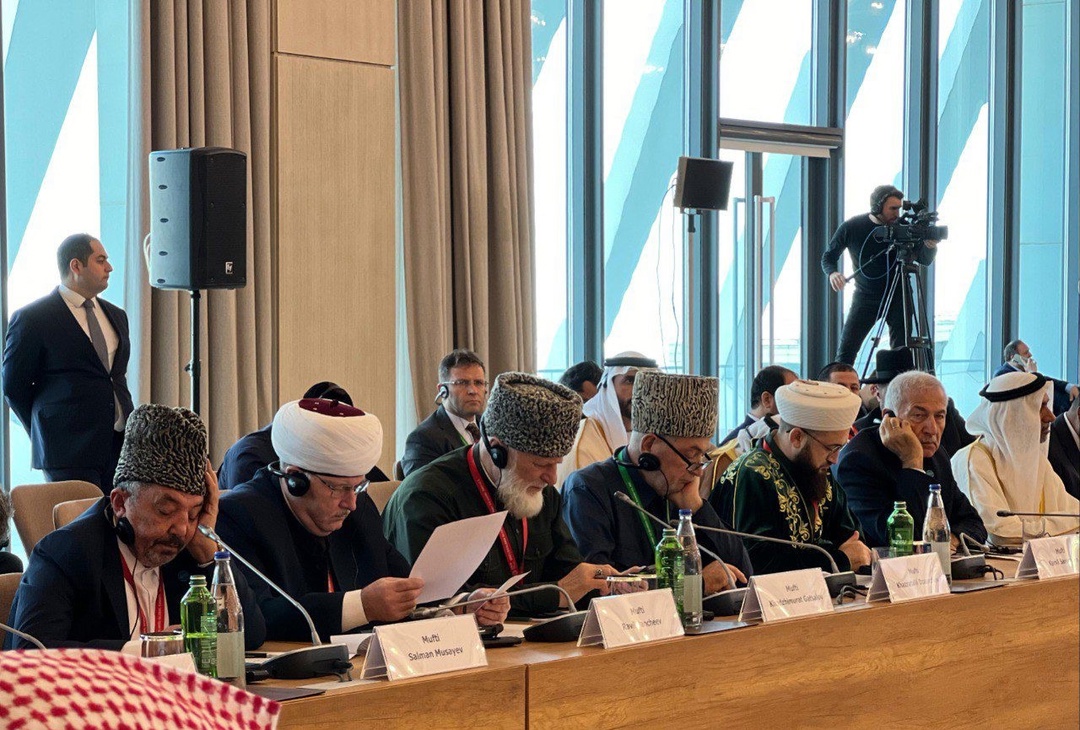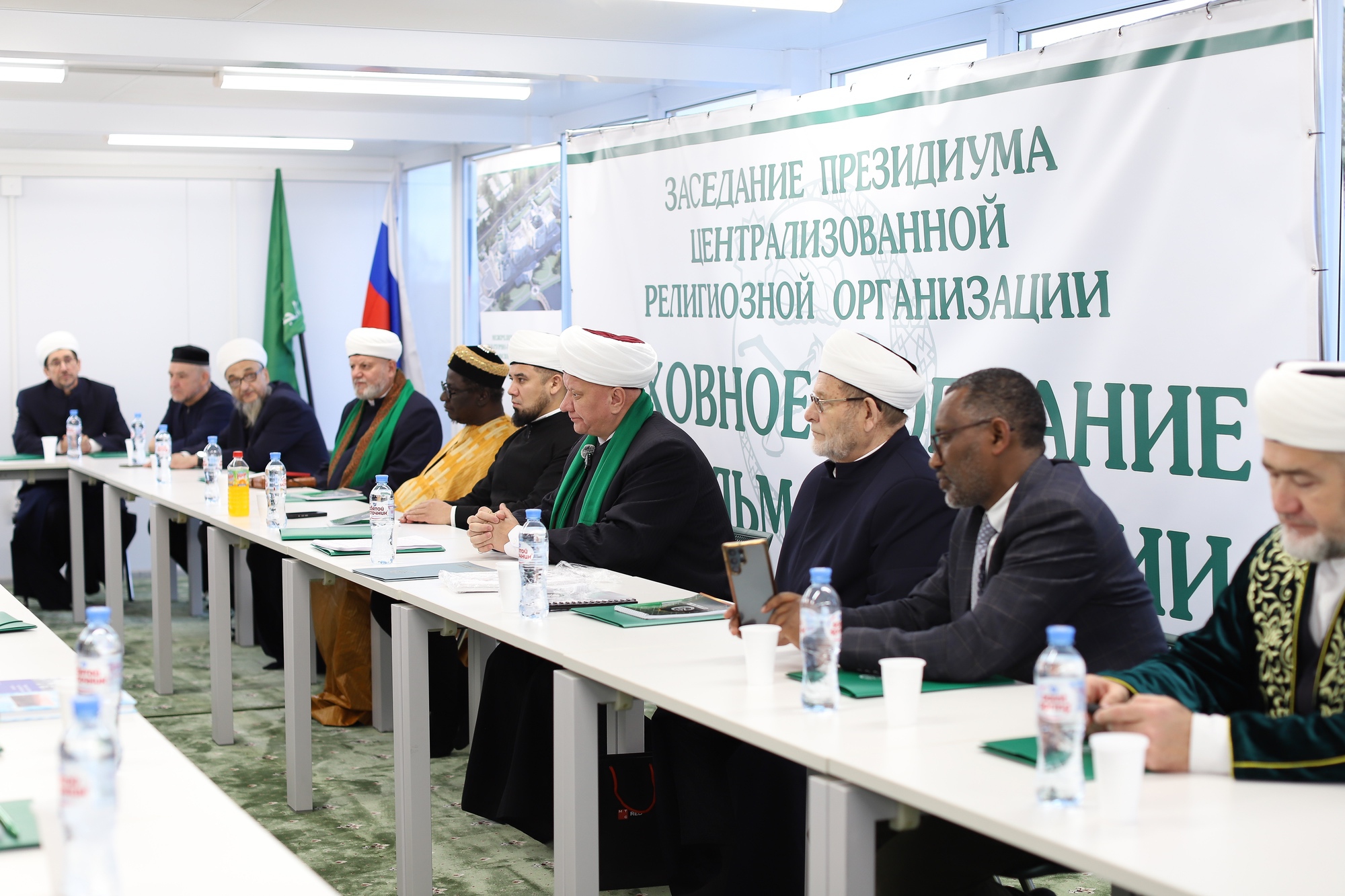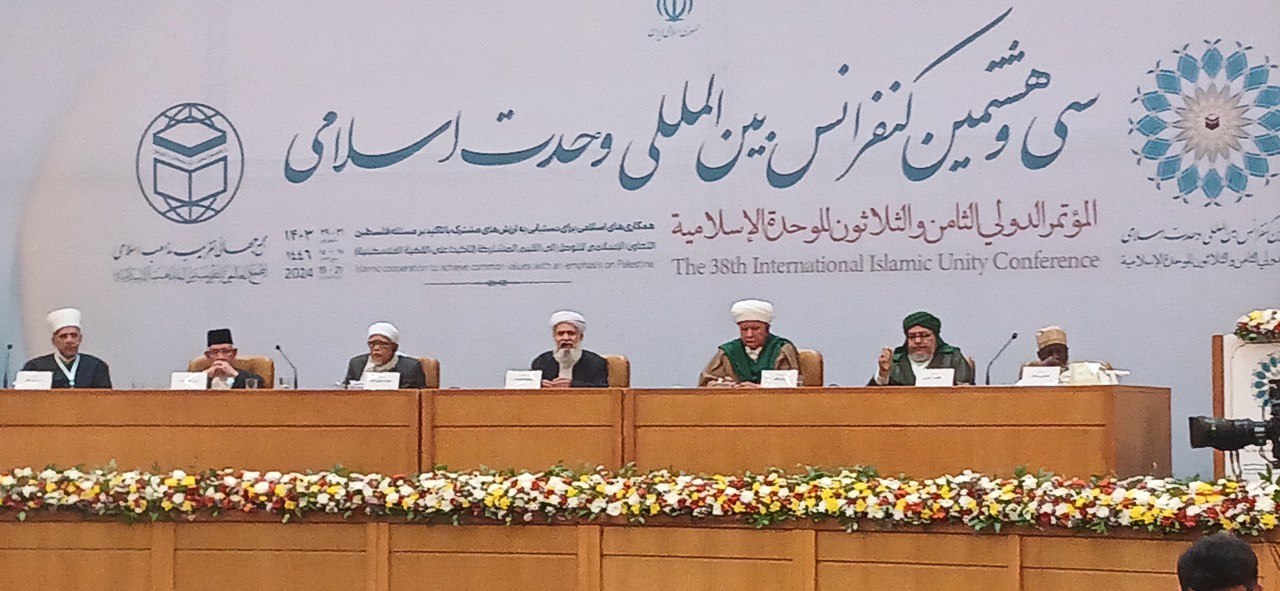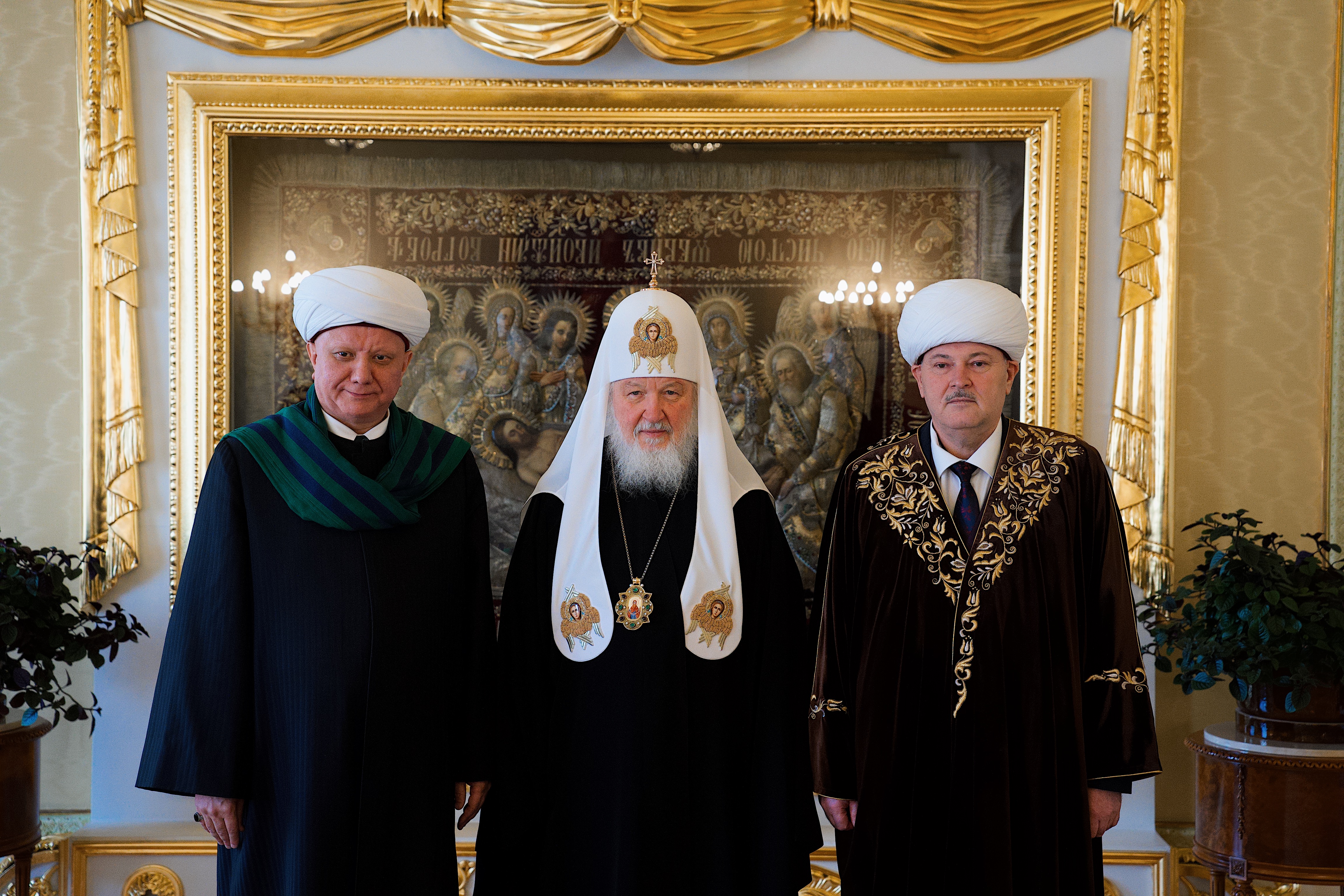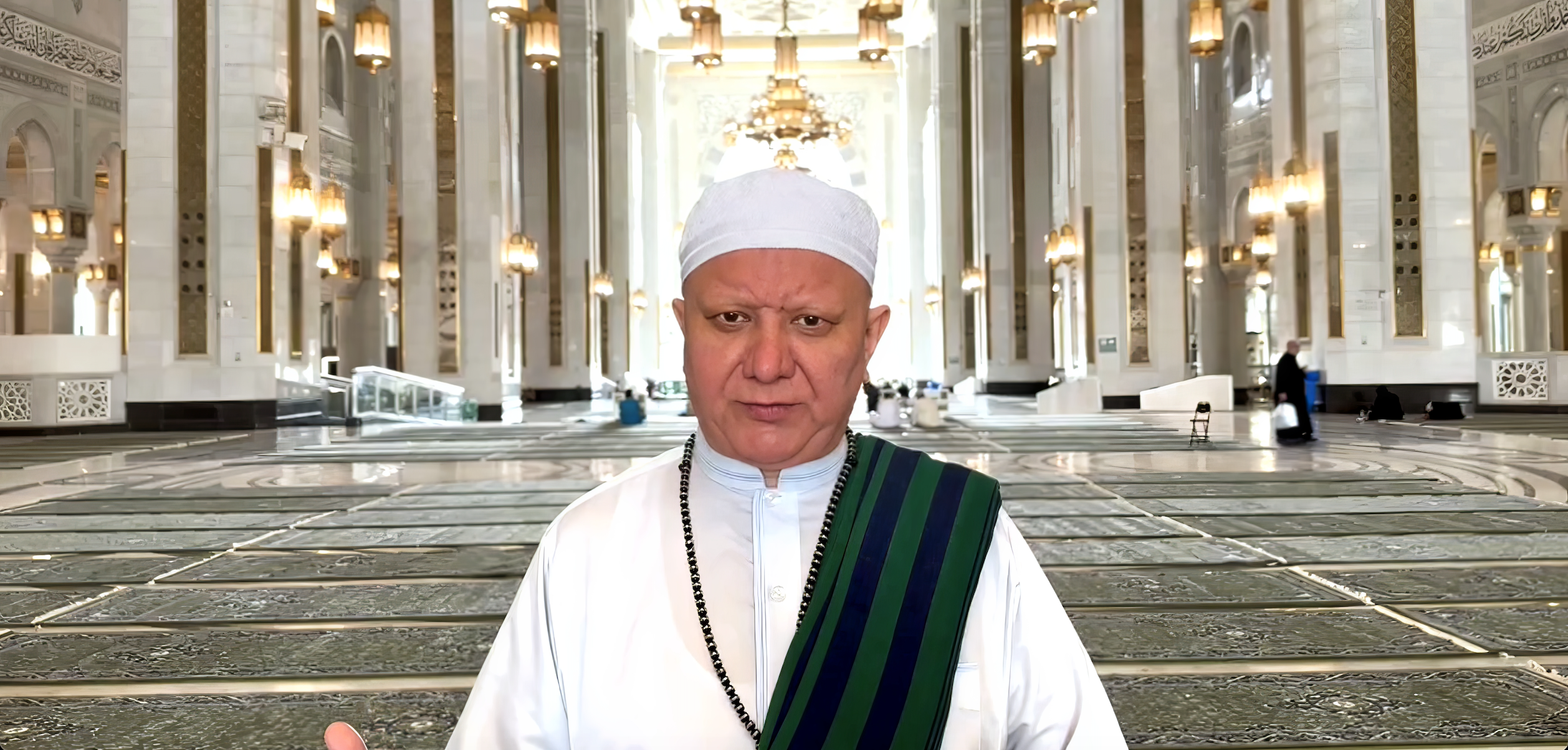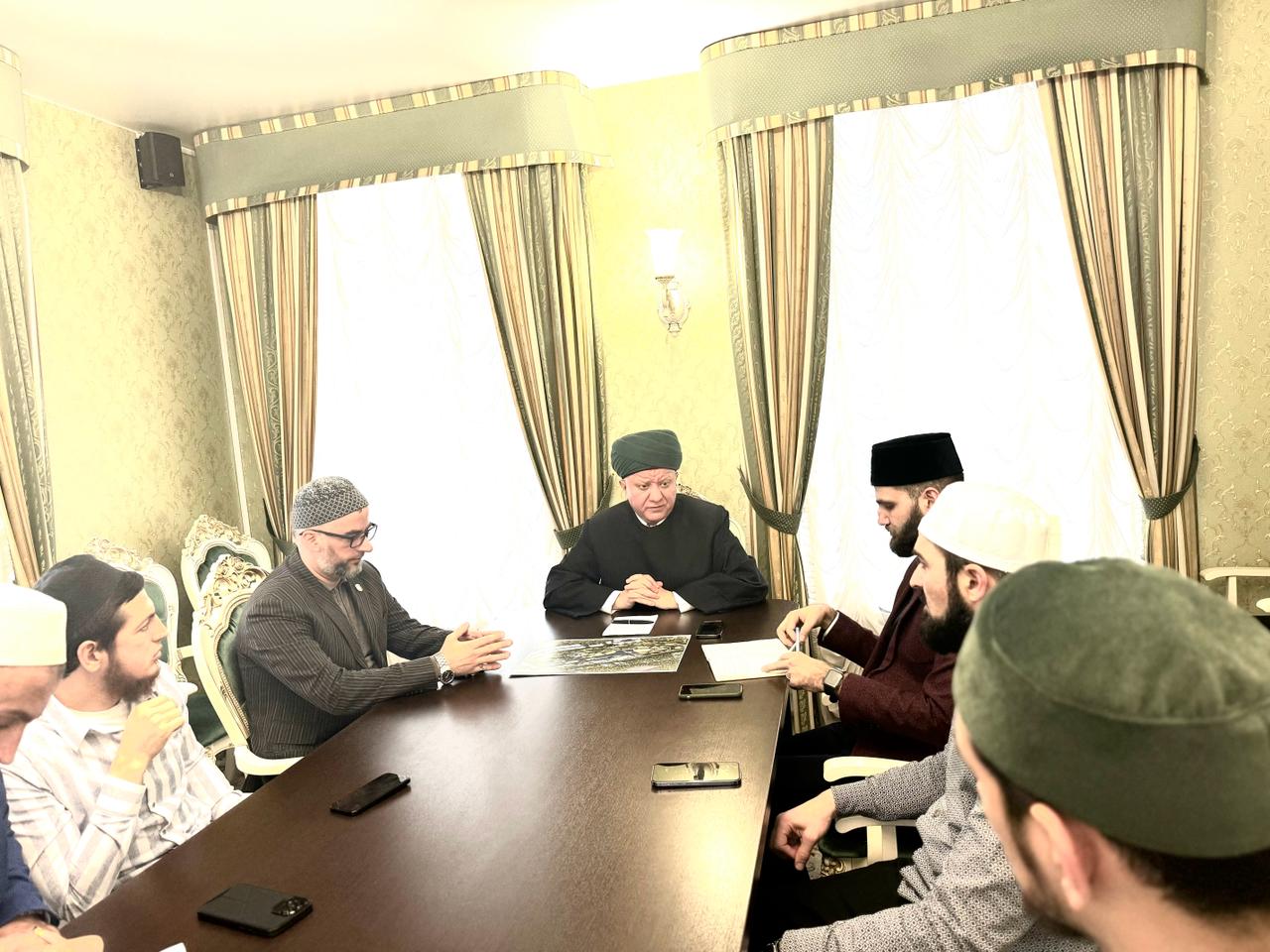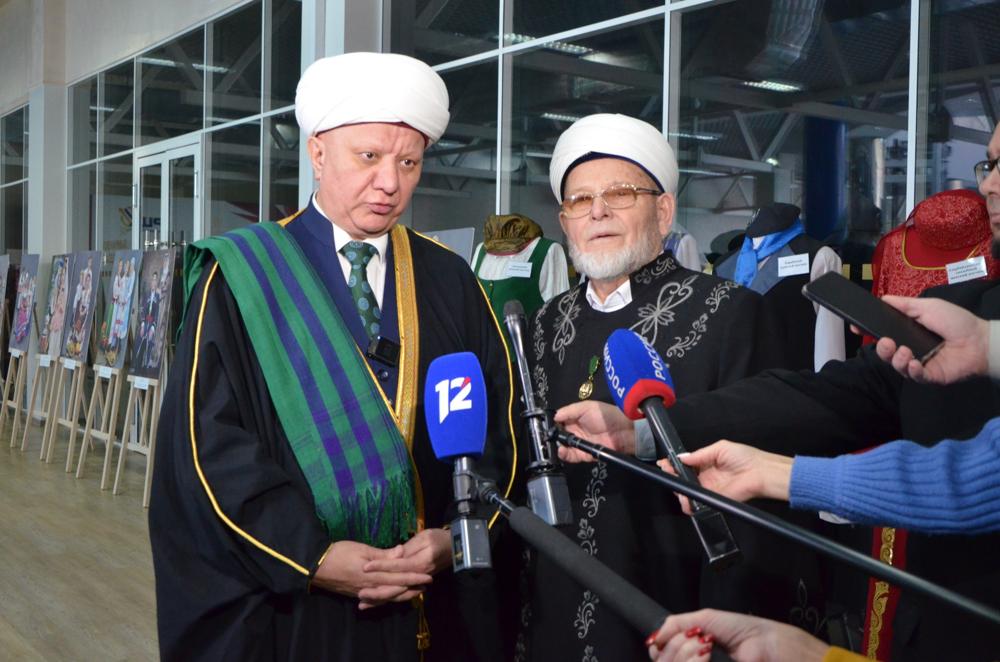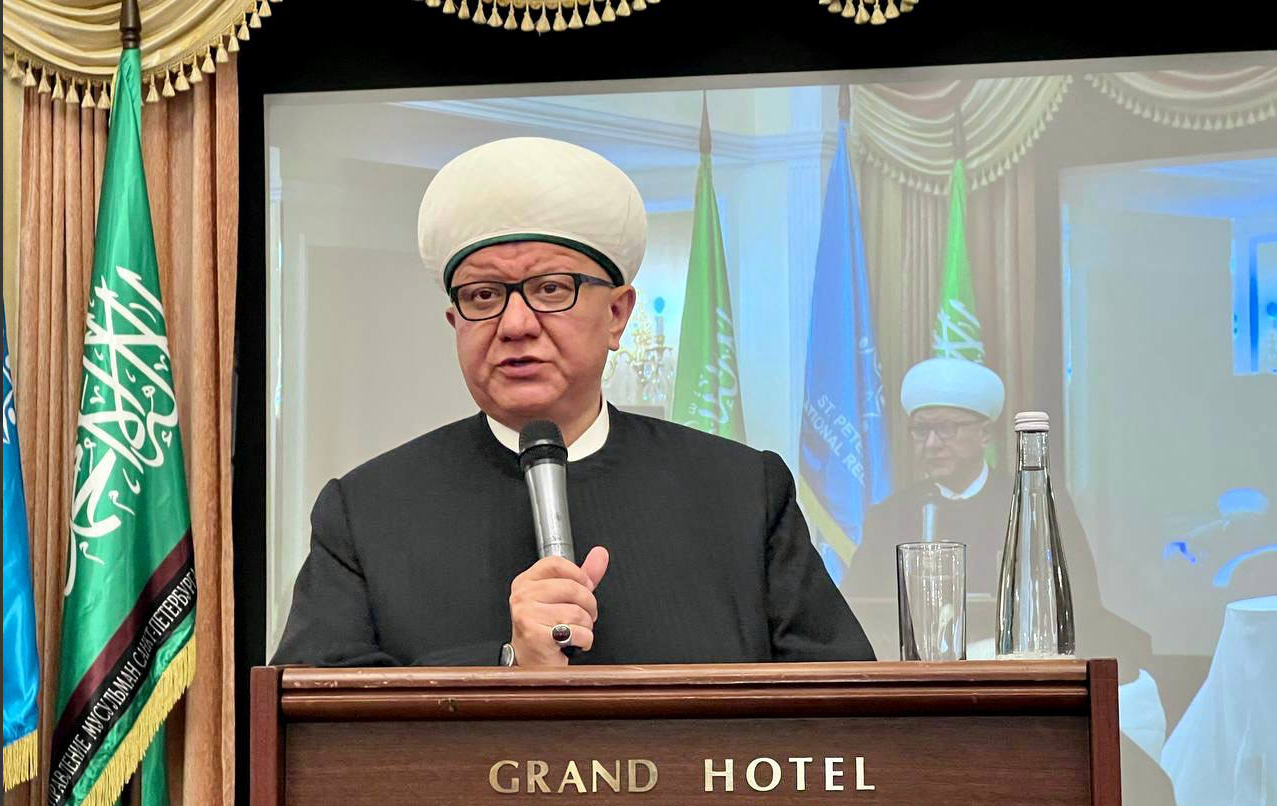Bata Kifah Mohamad, Advisor to the Mufti on International Affairs, Chairman of the Central Department of the Volgograd region, took part in the work of the international forum of the Qadiri Tariqat in the Republic of Senegal, on the assignment of the head of the Spiritual Assembly of Muslims of Russia, and Mufti of Moscow Albir Hazrat Krganov. This significant event brought together more than 50 religious leaders, scholars and representatives of Islamic organisations from 30 countries, including Morocco, Nigeria, Turkey, Indonesia and Russia.
In opening speech, Mufti Kifah Mohamad highlighted that Russia is keen to strengthen co-operation with African Muslim communities, especially in the field of education and social projects. "Our experience of inter-religious dialogue in multinational Russia can become a good model for African countries," he said.
The Qadiri tarikat, founded in the 12th century by Abdul-Qadir Gilani, holds an important place in West Africa, where its followers make up to 40 percent of the Muslim community.
Press office of the Spiritual Assembly of Muslims of Russia
November 7, 2024, Moscow
In the name of Allah, the Most Gracious, the Most Merciful! Assalamuallaikum varahmatullahi wa barakatuh!
Your Excellencies, Muftis and Hazrats, regional representatives and guests!
Let me once again congratulate you on the National Unity Day, wish you health, success and the mercy of the Almighty.
I would like to begin my speech with a pleasant mission: it is our deep pleasure to congratulate Mufti of the Republic of Bashkortostan Ainur Hazrat Birgalin on his unanimous re-election for a new term. The Spiritual Administration of Muslims of the Republic of Bashkortostan unites more than 950 parishes, more than 700 shakirds are studying in two madrasas of the Republic of Bashkortostan. This is a large amount of work. We wish Ainur Hazrat the help of the Almighty in fulfilment of service to the Ummah and high ideals of faith.
We sincerely congratulate Honourable Mufti of St. Petersburg and the North-West Region of Russia, First Deputy Head of the the Spiritual Assembly of Muslims of Russia Ravil Hazrat Pancheev on his 60th birthday. Honoured Ravil Hazrat does a great deal of work with believers, as well as to strengthen the international image of Russia. He is a reliable partner in strengthening traditional Islam. May Allah be pleased with him! Today he and Mufti of Tatarstan Kamil Hazrat Samigullin could not join us due to their participation in the UN International Conference on Ecology in Baku. Their participation in the representative forum is an important event.
Today we, by the grace of the Almighty, have gathered in Moscow to hold our extended meeting of the Presidium of the Spiritual Assembly of Muslims of Russia, which is taking place in the temporary administrative building of the future Islamic complex with the Moscow Central Cathedral Mosque named after the first Mufti of the Russian State Muhamedjan Hazrat Khusainov in the Interreligious Spiritual Cultural and Educational Centre in the territory of New Moscow.
It is deeply symbolic to hold our meeting these days on the land plot of the projected Interreligious Centre, the construction of which is supported personally by the President of Russia V.V. Putin. Today, in difficult times for our Motherland, the Muslims of the country consider it to be their primary duty to strengthen the unity and cohesion of the Russian society.
The famous Western politician Allen Dulles wrote a plan for the destruction of our country back in 1946, highlighting nationalism as the main instrument for the destruction of the USSR. We clearly see continuing attempts of enemies of our power by various ways of cognitive informational and psychological influence to quarrel people and religions.
Our task is to unite as much as possible, not giving our enemies even the slightest chance to realise their anti-Russian plans. Taking it into account, we call on the Muslims of Russia not to give in to provocations from the outside and not to hold uncoordinated public actions, to take a balanced, “cold-headed” approach to the information and provocations with which the Internet and the media are filled with today.
Our multinational country has always been famous for its mutual understanding and respect for different religions, cultures and traditions. It is important today to preserve this dialogue and mutual respect within the country, despite all that is happening far beyond its borders. Recently, however, we have observed trends that cause much of our concern.
We, Muslims, the indigenous inhabitants of Russia, representing more than sixty ethnic groups, have ancestrally lived here, on this land. We have no other homeland but Russia! We know and cherish our customs, traditions and faith. We are proud of our Russian civil identity, we recognise ourselves as an organic part of Russian society. Nevertheless, sometimes we have to hear words of dislike because of migrants and their sometimes inappropriate and terrible behaviour - this is unfair, unpleasant, and wrong.
We should not be considered as guests who have temporarily arrived in the country and judged by their actions and deeds, which do not share and thus have nothing to do with our original heritage and the true spirit of the Muslim people of Russia. One should not transfer negative attitudes towards migrants - extremists and offenders - to good Russian Muslims, native inhabitants of Russia, and thus form negative stereotypes of the perception of Islam and Russian Muslims.
The President of Russia V.V. Putin on April 2, 2024 at a meeting of the enlarged board of the Russian Ministry of Internal Affairs noted the need for a deep cardinal renewal of approaches to migration policy. «First of all, it is necessary to ensure the interests and security of the state and society, to save, preserve inter-ethnic and inter-religious harmony, our cultural, linguistic identity, everything that is the strength of Russia. The principle that only those who respect our traditions, language, culture and history can come to live and work in Russia - this principle should be decisive. We, the Muslims of Russia, are in solidarity with the timely and important words of the head of our state and support the position expressed by him.
A few words about another problem. During the years of Islamic revival in Russia, thousands of mosques destroyed in the atheistic past have been built. For a Muslim, a mosque is a kind of educational spiritual centre for studying and understanding Islam, strengthening Islamic solidarity and patriotic unity of society. I would like to remind that after Friday namaz in mosques prayers are offered for the welfare of the country and the leader of the state.
Our mosques are the Houses of Allah, sacred and revered places of worship that have existed in Russia for over a thousand years, long before the topic of migration came up, and will remain, Inshallah, after it. We gather in our mosques for prayer, enlightenment, education, strengthening in faith. Moreover, mosques are not only places of worship, but also unique manifestations of architecture that beautify our country and testify to the richness of spiritual diversity.
We believe that the issue of mosques, the allocation of land and the problem of their construction should not become a platform for tensions and Islamophobia. In general, any form of manifestation of Islamophobia, interreligious discord and conflict is inherently alien to Russia.
It should be noted that attempts to sow discord between Muslims and Christians in our country are fruitless and futile. In September of this year, in an interview with the Turkish “Anadolu” Agency, His Holiness Patriarch Kirill of Moscow and All Russia rightly emphasised: «Take a closer look at Russia's experience. We can have anything, but we do not have one thing - inter-religious discord. There has never been any! Orthodox and Muslims are brothers - truly, not by diplomatic etiquette... Russia is an example of almost perfect relations between Orthodoxy and Islam. That is why everything is so strong in our country from the point of view of national solidarity. We have no reason to enmity with Muslims, they have no reason to enmity with us». We, Muslims, are in solidarity with the expressed words of His Holiness and today, more than ever, we all should be united and firm in our desire for peace, dialogue and good-neighbourliness.
I would like to emphasise that Islam in Russia is first and foremost a religion and not a tool of politics. We must clearly and precisely define that our spiritual heritage is based on the principles of faith, mercy and justice, which do not depend on political conjuncture and do not pursue political goals. Demagogues and adventurers are out of our way.
Islam in Russia is a religion that is deeply rooted in the history of our country, and it has always played an important role in shaping the cultural and spiritual image of our people. It is a religion whose values have been reflected in the hearts of tens of millions of people in our country, inspiring them to works of mercy and good neighbourliness, protection of the Fatherland, creation and peaceful coexistence. When we speak of Islam, we speak of a faith that unites us, teaches us love for our neighbours and respect for the diversity of opinions and traditions. It is a religion that calls for the search for truth, inner peace and the pursuit of self-improvement, and opposes confrontation, xenophobia, violence and extremism.
Russia has been and remains a stronghold of traditional spiritual and moral values on which human civilisation is built. Our choice is shared by the majority of people in the world, including millions of citizens of Western countries, as demonstrated by the recent BRICS meeting in Kazan. I would like to emphasise the role of the Head of the Russian State Vladimir Putin in supporting our traditions and values and the respectful and trusting attitude of all traditional religions of Russia towards each other. The President of Russia stressed that «Russia's strength lies in the free development of all people, in the diversity and harmony of cultures, languages, traditions; in mutual respect and dialogue among Orthodox Christians, Muslims, followers of Judaism and Buddhism.
Preserving and strengthening the established interreligious dialogue and traditions of ethno-confessional relations in Russia is an imperative of our common activity.
The high moral ideals of Russia's traditional religions strengthen the cohesion of society and its unity. This good relationship between religions has a favourable effect on the situation in the country and makes an important contribution to its stability.
It is a historical fact that Russia has emerged as a civilisational State, as the world's largest multi-ethnic and multi-religious State, thanks to the unifying role of the Russian people and other people, which preserves Russia's unique unity and diversity.
This is also facilitated by the implementation of the Fundamentals of State Policy for the Preservation and Strengthening of Traditional Spiritual and Moral Values, approved by Decree of the President of the Russian Federation V.V. Putin No. 809 of 9 December 2009. Due to this document, the activities of the authorities, religious organizations and the public in this area are reaching a new qualitative level of dialogue, mutual understanding, cooperation and responsibility, requiring common solidarity, new ideas, approaches and practices.
For Muslim organisations, activities to preserve spiritual and moral values are a priority. The reference point for the spheres of application of our efforts is point 10 of the Fundamentals which stipulates that the state policy for the preservation and strengthening of traditional values is implemented in the fields of education and upbringing, youth work, culture, science, inter-ethnic and inter-religious relations, mass media and mass communications, and international cooperation.
In this connection, I note that the daily activities of Muslim organisations, work with believers in parishes, Islamic education and enlightenment, and all forms of social service of Islam are aimed at strengthening the basic spiritual and moral foundations of the life of society and the State.
In modern conditions, the issues of education are topical, and they occupy a significant place in the activities of regional spiritual administrations of Muslims.
I would like to note that the revival of Islam is going on fully on the basis of its historically established system of religious education and domestic theology with the support of the state.
We, Muslims of Russia, with the name of our President V.V. Putin, associate the solution of the issues of formation of an integral system of modern religious Islamic education and development of the national theological school and we are moving in this direction.
It is highly important for the Muslim people of Russia not to break away from tradition, to unite our efforts in the revival and development of national theology, the study of traditional Islamic spiritual values and their implementation
in the educational process, in scientific research, in educational practice
and in the processes of formation of the civic identity of Russian Muslims.
With the activities of the Council for Islamic Education and the formation of the Bulgarian Scientific-Educational Cluster, the activation of our activities in the Scientific-Educational Theological Association, we link our hopes for increasing the effectiveness of educational activities and theological research, updating the educational and methodological base, success in the training of Islamic personnel. These issues are in the centre of attention of regional Spiritual Administration of Muslims.
Today Russia is going through a difficult time, and in this difficult period the Muslims of the country not only in word but also in deed support our Fatherland both on the front line of Special Military Operation and in the rear, demonstrating the cohesion and unity of the people of Russia. Today we are fighting for life, identity and independence, if you want, I can name it Autocracy, for the right to be and remain a sovereign Russia.
The Armed Forces of Russia are worthily fulfilling their mission to protect Russia's national interests, showing patriotism and military valour, loyalty to the Fatherland, oath and duty.
The spiritual and moral potential of Islam is aimed at fostering high ideals, helping to ensure that the spiritual basis of military service in modern Russia is based on values such as patriotism and citizenship, military duty and honour, courage and heroism, faith in God and sacrifice.
It is important to note that the spiritual and moral potential of Islam is aimed not only at strengthening the historical tradition of military service to the nation and Fatherland, but also at the spiritual, moral, psychological and social rehabilitation of soldiers and at providing assistance to their families.
Since the first days of the Special Military Operation, the structures of the Spiritual Assembly of Muslims of Russia have been working hard and continuously to provide spiritual and humanitarian assistance to servicemen and their families. The data is reflected in the handout. The Spiritual Assembly of Muslims of Russia structures regularly collect humanitarian aid and then send the cargo to the zone of the Special Military Operation. Parishioners collect funds to buy everything necessary: cars, quadrocopters, thermal imagers, night vision devices, camouflage nets, electric generators, potbellies, petrol saws, sets of keys for repairing tanks, shovels, axes, warm clothes, hygiene products, medicines, food and much more. In addition to collecting money for the funds, Muslim organisations sent several vehicles to servicemen.
Humanitarian aid is also provided to the inhabitants of the new territories. In addition to humanitarian aid, spiritual support is also provided to the fighters and their families: regular prayers (duaa) are organised for the mobilised and their families, letters of support are sent from schoolchildren, and brochures with short prayers for the mobilised are published. All these efforts emphasise the unity of the people and the common concern of the Muslims of Russia for the defenders of our Fatherland.
Honourable Hazrats!
Recently a lot of work has been done to reconstruct the building of the Islamic Institute named after Muhamedjan Khusainov in Moscow, to design an Islamic complex with the Moscow Central Cathedral Mosque named after Muhamedjan Khusainov. Muhamedzhan Khusainov in the Interreligious Spiritual Cultural and Educational Centre in the territory of New Moscow (Kommunarka). The foundation stone of mosques and blessings were laid in (Yekaterinburg, Primorye, Surgut, Irkutsk region). Mosques are being built in the regions (...Volzhskoye in the Volgograd region, Chuvashia, Irkutsk and Omsk regions). Beautiful in their architecture complexes are being completed in Makhachkala and Simferopol. Work is underway to build madrasah for the entire Siberian region in Novosibirsk, and work in this direction is also underway in Lugansk.
The Spiritual Assembly of Muslims of Russia continues comprehensive work to strengthen the communities of the new subjects of the Russian Federation
and I would like in this regard to thank the deputy head of the Spiritual Assembly of Muslims of Russia Denis Hazrat Mustafin, supervising from the Spiritual Assembly of Muslims of Russia this issue, and Mufti of the Lugansk People’s Republic (LPR) Muhammad Hazrat Gambarov, Mufti of the Moscow region, supervising from the Spiritual Assembly of Muslims of Russia work on cooperation with the Ministry of Defence of the Russian Federation Daud Hazrat Mukhutdinov.
Imam of Kursk region Isa Salimsultanov deserves high words of gratitude for his feats of saving the lives of civilians of Kursk under enemy fire. And of course, all regional Spiritual Administrations of Muslims without exception deserve words of gratitude for their great contribution to the victory of good over evil. Your contribution to the common cause is simply invaluable!
In the Lugansk People's Republic, work is underway to revive Islamic education. There, solemn events were held to establish a future school and madrassah for new subjects, which will be named after Hero of Russia Nurmagomed Gadzhimagomedov, who gave his life in the Special Military Operation. The establishment of the madrasah became possible due to the efforts of the Presidium of the Spiritual Assembly of Muslims of Russia, the project was unanimously supported by the Muslim clergy and blessed by the hero's father, Engels Magomedovich Gadzhimagomedov. The new educational institution will serve as a coordination and methodological centre for Muslim organisations in the new subjects of the Russian Federation.
Another large-scale International Religious Summit was held in St. Petersburg through the efforts of the authorities of the Leningrad Region, the Spiritual Administration of Muslims of St. Petersburg and the North-Western region of Russia, which brought together guests from more than 40 countries. Important educational forums were held in Tomsk, Omsk, Volzhsk and in Ufa.
The Spiritual Assembly of Muslims of Russia declared solidarity with the Palestinian people, condemned the Israeli aggression against the Gaza Strip. We took with deep pain the news of the tragic events in Lebanon, caused by the Israeli strike and the explosions of household appliances on ordinary citizens, which resulted in human casualties. As part of public diplomacy, we strongly express our Islamic solidarity, the need to end Israeli aggression and bring peace to the Middle East.
In the framework of public diplomacy, the Spiritual Assembly of Muslims of Russia has been active in international affairs, establishing and strengthening ties and cooperation with co-religionists in a number of foreign countries. In order not to overload the agenda, I will name events and facts only for the last two months.
Thus, on 27 August, a diplomatic reception was held in Moscow with the participation of representatives of the Spiritual Assembly of Muslims of Russia on the occasion of the 79th anniversary of the independence of the Republic of Indonesia. Prominent Russian diplomats, orientalists and public figures congratulated Indonesian friends and colleagues on Independence Day.
On 12 September in the capital of Tatarstan, the head of the Spiritual Assembly of Muslims of Russia held a meeting with the Deputy Secretary General of the World Islamic League and the Ulema Council of the Kingdom of Saudi Arabia, Dr. Abdul-Rahman bin Abdullah Al-Zeid. This high level meeting took place within the framework of the visit of the delegation of the World Islamic League, which arrived in Kazan at the invitation of the Spiritual Assembly of Muslims of Russia and the Public Chamber of the Republic of Tatarstan to participate in the international roundtable ‘BRICS Public for Sovereign Development».
On 19 September, Tehran hosted the opening of the 38th International Conference of Islamic Unity, which is held under the motto «Islamic Cooperation to Crystallise Common Values with a Focus on Palestine». The forum was held with the participation of more than three hundred famous religious and public figures from East and West Asia, Malaysia, Indonesia and America. Together with the head of the Spiritual Assembly of Muslims of Russia, the Mufti of the Volgograd region, Bata Kifah Mohammad, took part in this major international religious forum.
On 20 September this year, the head of the Spiritual Assembly of Muslims of Russia held a meeting with Ayatollah Hamid Shahriyari, Secretary General of the World Assembly for the Rapprochement of Islamic Madhhabs.
On 24 September 2024 in Moscow with the participation of representatives of the Spiritual Assembly of Muslims of Russia there was held a solemn reception dedicated to the 94th anniversary of the National Day of the Kingdom of Saudi Arabia.
On 21 October 2024, a delegation of Muslim scientists from the Republic of Iraq, headed by the Deputy Chairman of the Association of the Council of Alim Al-Ribat Al-Muhammadi, member of the Supreme Council of the Suni Waqf of Iraq, Doctor of Shariah Sciences, Sheikh Muhammad Jassem Al-Nuri, visited a residence of the Spiritual Assembly of Muslims of Russia.
We recently received an invitation from the UN to participate in an international conference. The Spiritual Assembly of Muslims of Russia has a special consultative status in the UN Economic and Social Council (ECOSOC) and a lot of analytical work is being done in this direction. These days we have guests from 9 countries with us at the events, I would like to especially welcome the delegations from Ethiopia and Senegal. I express my sincere gratitude to the Ministry of Foreign Affairs of the Russian Federation for supporting our activities.
As a religious figure, I would like to emphasise that the international activities of religious Islamic organisations, reflecting the aspirations and hopes of millions of believers, strengthen the social base, the basis of modern state diplomacy and instruments of «soft power» in the international arena.
In March this year, a warm meeting was held with Patriarch Kirill of Moscow and All Russia. An open, kind dialogue took place with an understanding of common values, such as love for the Fatherland, patriotism and fidelity to traditions. The historically good relations between Orthodox and Muslims were noted. As a result of the meeting, the importance of unity and interreligious harmony in the country was emphasised, which serves as a guarantee of peace and harmony between nations.
An annual expert report on the observance of Muslim rights in the Russian Federation for 2024 is being prepared. Active expert and analytical work is in progress to monitor the situation with the rights of believers. The report contains recommendations to various structures for further improvement of work in the area of freedom of conscience and religion. This document makes a certain contribution to the further development of the human rights movement in the country.
The Spiritual Assembly of Muslims of Russia is working on a number of important social projects, such as: IslamInform information and educational project, under which the “IslamInform” information agency was created, a concept was developed and a unified information portal on Islam in Russia - «Muslims of Russia» - was created. Projects are being implemented jointly with the Federal Penitentiary Service of Russia to prevent the spread of terrorist and extremist ideology in penal colonies.
We note the “Ostabike” Festival of Islamic Art, within the framework of which creative and educational events are planned that contribute to the visualisation, preservation and promotion of traditional family values: art symposiums for artists to create works on the themes of family and childhood; lectures and open master classes on motherhood and upbringing themes in Islam; exhibitions in Moscow, Kazan, Chelyabinsk, Cheboksary and Irkutsk.
The “Ansar” All-Russian youth forums, the “Iman” All-Russian children's and youth gathering, training seminars for spiritual leaders and imams in the federal districts of Ufa, Volgograd, Moscow, Kemerovo and other projects have a positive resonance.
Today, work in the information field is extremely important. It is necessary to strengthen work in the media for all structures of the Spiritual Assembly of Muslims of Russia, finding new forms of delivering accurate and correct information. This is a really important issue that requires our attention. This is a real front!
Strengthening interaction between the regions in the media, entering the federal information agenda of regional Spiritual Administrations of Muslims will be an important step for the appearance of accurate information in the information space. It is important to focus on working with young people, involving them in our projects.
As noted earlier, it is necessary to pay attention to manifestations of migrantophobia (which affects the indigenous inhabitants of Russia), active calls against the construction of mosques, public complaints and appeals, without giving in to emotions and provocations. We strive to solve problems arising in the regions of Russia in accordance with the law in a calm tone and in the format of dialogue. Emotions cannot solve them; we need balanced work. Sometimes we see that the heads of religious organisations themselves need to bring their documents into compliance. It is necessary to strengthen educational work in the regions, to work more with the public and the population, to form positive content about the activities of Islamic organisations, to increase our information presence in the Internet space and social networks.
At present, the Muslim community of Russia, as an integral part of society, is experiencing tremendous pressure from the constantly emerging challenges of the modern world, many of which have not been answered yet. In this regard, the secular institutions of the state and religious organisations have a serious burden and responsibility to address emerging issues that may simultaneously affect several spheres of people's lives, including cultural, religious and national.
The main problem in this case is the inability of Muslim structures and the state to give a single unified answer, due to the multinationality and multi-religiousness of the Russian people, thus leaving a field for the ideological activities of foreign ideological centres. In this regard, we initiated the creation of a collegial structure - the Council on Fatwas with the involvement of the best scholars. We spoke about this issue at the St. Petersburg Legal Forum and at the religious summit. Almighty Allah has commanded: «Ask the people of knowledge if you yourselves do not know» (an-Nahl 16:43). Muhammad ibn Sirin (may Allah have mercy on him), said, «Verily this knowledge is religion, so see from whom you adopt religion for yourselves.» And as the proverb says: «The mill is judged not by the stone building but by the quality of flour»!
Also, in order to increase the effectiveness of this structure, it is planned to create a theological Expert Council from among religious figures who have, in addition to theological knowledge, a high level of secular education and experience in state-confessional relations, which will be engaged in public monitoring, collection and analysis of information on current issues and the results of the adopted fatwas. The creation of a single body on fatwas will ensure spiritual and ideological unity of the Muslim community of the Russian Federation on major and significant issues on the public agenda, which will significantly increase the stability of ethno-religious relations in society.
Dear friends!
At the end of my speech, I would like to express my sincere gratitude to the leadership of the Foundation for the Support of Islamic Culture, Science and Education for their support of our initiatives and assistance in the implementation of important projects and tasks for the country.
I also express my gratitude to the heads of the regions and federal structures of power, who always kindly and with a kind open heart and understanding come to the aid and provide all possible support to the Spiritual Assembly of Muslims of Russia and its structures. And our prayers for Allah's pleasure for all our brothers and sisters involved in the development of Islam, imams and muezzins, teachers, benefactors, parish councils, muhtasibs and muftis.
I am convinced that relying on the Holy Quran and following the precepts of the Prophet Muhammad (peace and blessings of Allah be upon him), relying on the understanding of co-religionist in cooperation with the authorities, we will be able to overcome all difficulties, become stronger and more united in defence of the interests and ideals of our Motherland, in preserving the original cultural and spiritual and moral foundations of our life and the sustainable future of Russia.
The report is over.
Thank you for your attention.
November 11, 2024
Within the framework of the 29th session of the Conference of the Parties to the United Nations Framework Convention on Climate Change (COP29), the Global Religious Leaders Summit was held in Baku under the auspices of His Excellency Mr Ilham Aliyev, the President of the Republic of Azerbaijan.
At the invitation of Sheikh-ul-Islam Allahshukur Pashazade, Chairman of the Caucasus Board of Muslims, Mufti of the Spiritual Board of Muslims of St. Petersburg and North-West region of Russia Ravil Hazrat Pancheyev took part in the work of the forum.
The summit, held under the slogan “World Religions for a Green Planet”, was organised by the Ministry of Ecology and Natural Resources of the Republic of Azerbaijan, the State Committee for Work with Muslim Religious Organisations, the Council of Muslim Elders, the United Nations Environment Programme (UNEP) and the Caucasus Board of Muslims. The event was also attended by about 300 prominent world religious leaders, representatives of foreign governments, high-ranking UN officials, heads of international organisations, scientists and religious figures.
Press service of the Spiritual Assembly of Muslims of Russia.
November 11, 2024
An enlarged meeting of the Presidium of the Spiritual Assembly of Muslims of Russia was held, which was attended by representatives of the Spiritual Assembly of Muslims of Russia from more than 30 regions of Russia and invited guests from Moscow, Bashkortostan, Tatarstan, the Crimea, representatives of federal authorities, as well as Muslim organisations from Senegal and Ethiopia. It is symbolic that the meeting was held on the territory of the Interreligious Spiritual Cultural and Educational Centre under construction in the settlement of Kommunarka (Moscow).
The head of the Spiritual Assembly of Muslims of Russia, the Mufti of Moscow, Albir Hazrat Krganov, made a large detailed report on the main issues and directions of activity of the Russian Ummah.
The meeting discussed pressing problems of Russian Muslims: the demographic situation of indigenous Muslims in the country, the upbringing of children with the right moral guidelines, the preservation of traditional family values, issues of support for families and participants in the Special Military Operation, as well as the issue of control of migrants in the Russian Federation. The issue of the international agenda of the work of the Spiritual Assembly of Muslims of Russia was raised, as well as support for the Palestinian people.
Muftis from Russian regions, including representatives of Bashkortostan and Tatarstan, discussed the need to expand infrastructure for the Muslim community in Moscow. There are often appeals from citizens about the lack of space for women and children, which requires the creation of new spaces and cultural centres. Additional spaces are needed for cultural events, education and leisure activities, which will strengthen the connection of Muslims with the spiritual and cultural heritage of our country.
“We Muslims, the indigenous inhabitants of Russia, representing more than sixty ethnic groups, have ancestrally lived here on this land. We have no other homeland but Russia! We know and cherish our customs, traditions and faith. We are proud of our Russian civil identity, we recognise ourselves as an organic part of Russian society. But sometimes we have to hear words of dislike because of migrants and sometimes their inappropriate and ugly behaviour - this is unfair, unpleasant, and wrong. We should not be considered as guests who have temporarily arrived in the country and judged by their actions and deeds, which do not share and thus have nothing to do with our original heritage and the true spirit of the Muslim people of Russia. It is impossible to transfer negative attitude to migrants - extremists and offenders - to good Russian Muslims, native inhabitants of Russia and thus form negative stereotypes of perception of Islam and Russian Muslims” - said in his speech Albir Hazrat.
Special attention was paid to the topic of mosque construction in Russia. Muftis of Russia's regions shared their experience of constructive co-operation with regional authorities. The Interreligious Spiritual Cultural and Educational Centre with the Moscow Central Cathedral Mosque named after the first Mufti of Russia Muhamedzhan Khusainov (buried in Bashkiria) on the territory of the settlement of Kommunarka (Moscow) was also discussed. The attendees noted that mosques are built for their citizens, for the citizens of Russia, for indigenous Muslims who originally lived on the territory of Russia. The mosque serves not only as a place of worship, but also as an important social and cultural centre, especially for the indigenous peoples of Russia.
Head of the Spiritual Assembly of Muslims of Russia, Mufti Albir Hazrat Krganov emphasised: “Over the years of Islamic revival in Russia, thousands of mosques destroyed in the atheistic past have been built. For a Muslim, a mosque is a kind of educational spiritual centre for studying and understanding Islam, strengthening Islamic solidarity and patriotic unity of society. I would like to remind that after Friday namaz in mosques prayers are offered for the well-being of the country and the ruler of the state. Our mosques are the Houses of Allah, sacred and honoured places of worship, which have existed in Russia for more than a thousand years, long before the topic of migration, and will remain, Inshallah, after it. We gather in our mosques for prayer, enlightenment, education, strengthening in faith. Moreover, mosques are not only places of worship, but also unique manifestations of architecture that adorn our country and testify to the richness of spiritual diversity. We believe that the issue of mosques, the allocation of land and the problem of their construction should not become a platform for tensions and Islamophobia. In general, any form of manifestation of Islamophobia, interreligious discord and conflict is inherently alien to Russia. It should be noted that attempts to sow discord between Muslims and Christians in our country are fruitless and unpromising”.
Distinguished muftis and imams spoke on the agenda and other pressing issues of the regional muftis' activities: Mufti of the Spiritual Administration of Muslims of Siberia Zulkarnay Shakirzyanov, Mufti of the Spiritual Administration of Muslims of the Republic of Bashkortostan Ainur Birgalin, Deputy Mufti of the Republic of Tatarstan Ravil Zuferov, Deputy Mufti of the Muslims of Crimea Esadullah Bairov, Chairman of the Muftiate of the Republic of Dagestan Abdullah Salimov, Mufti of the Spiritual Administration of Muslims of Novosibirsk region Salim Shakirzyanov, Mufti of the Spiritual Administration of Muslims of Lugansk People's Republic Muhammad Ismail Gambarov, Mufti of the Spiritual Administration of Muslims of Sverdlovsk region Abdul Kuddus Asharin, Mufti of the Spiritual Administration of Muslims of Volgograd region Bata Kifah Mohamad, Mufti of the Centralized Religious Organisation of Muslims ‘Baikal Muftiyat’ Farid Mingaleev, Mufti of the Spiritual Administration of Muslims of Tomsk and Tomsk region Nurulla Tursunbaev, Deputy Mufti of Khanty-Mansi Autonomous Region of Yugra Kamil Samatov, Mufti of the Spiritual Administration of Muslims of Kemerovo region Tagir Bikchantaev, Mufti of the Spiritual Administration of Muslims of Penza region Abubyakyar Yunkin, Chairman of the Spiritual Administration of Muslims of Chuvashia Mansur Khaibullov and First Deputy Mufti of Chuvashia Ilyas Safiyanov, Mufti of the Spiritual Assembly of Muslims of Primorsky Territory Ramil Kilmukhametov, Mufti of Moscow region Daud Mukhutdinov, Chairman of the Spiritual Administration of Muslims of the Republic of Sakha (Yakutia) Musa Sagov, imam-hatib of Murmansk region Muhammadhabib Gadzhayev, Chairman of the local religious organisation of Muslims ‘Way’ in Chelyabinsk Raul Tukhvatulin and other representatives of Muslim organisations from Dagestan, Vladivostok, Petropavlovsk-Kamchatsky, Amur, Pskov, Smolensk, Tver and Vladimir regions, Mordovia, Rostov-on-Don, Kursk, Lipetsk.
In conclusion, the head of the Spiritual Administration of Muslims, Mufti Albir Hazrat Krganov once again noted the productivity of the joint work of all the regional offices, thanked the Hazrats for their great work in strengthening Islam and the Russian Ummah, wished them further success and the help of the Almighty in the implementation of all the plans.
Press-service of the Spiritual Assembly of Muslims of Russia
https://dsmr.ru/en#sigProId7bf22f3cdc
The grand opening of the conference took place in the capital of Iran with the participation of more than 300 famous religious and public figures from the countries of East and West Asia, Malaysia, Indonesia, and America. Together with the head of the Spiritual Assembly of Muslims of Russia, Mufti of Moscow Albir hazrat Krganov, Mufti of the Volgograd Region Bata Kifah Mohammad is also participating in a major international religious forum. It is no coincidence that the main theme of the conference was chosen “Islamic cooperation for the crystallization of common values with an emphasis on the topic of Palestine.”
Secretary General of the World Forum for the Rapprochement of Islamic Schools of Thought, Hojjat-ul-Islam Hamid Shahriari, emphasized that today the most important practical connection between the Muslim Ummah remains the Palestinian issue, so this year we had an addition called the Unity Conference, which particularly emphasizes the Palestinian issue.
Recall that in August 2023, the Russian delegation headed by Mufti Albir Hazrat Krganov paid a working visit to Tehran, during which religious organizations of Russia and Iran discussed the potential for joint cooperation. Earlier, Albir Hazrat discussed a number of important issues in the area of further interaction and cooperation with Hamid Khavali Shahriyari during the meeting of the Russia-Islamic World Strategic Vision Group and the World Organization for the Rapprochement of Madhhabs in Moscow.
The participants of the 38th session of the Conference of Islamic Unity noted that today Islam is the foundation of Islamic civilization and contains great canonical, social, spiritual, moral, mobilization and integrating potential for the development of the world ummah. In this regard, it is necessary to note the growing importance of the movement for the rapprochement of Islamic madhhabs, the positive role of the Supreme Advisory Council for the Rapprochement of Madhhabs and the International Society for the Rapprochement of Madhhabs, the World Assembly for the Rapprochement of Islamic Madhhabs. Solidarity, strengthening and further development of the Muslim world, continuation of the dialogue of world religions and civilizations, the general state of world relations largely depend on a true, correct understanding of the foundations of Islam.
In his speech, Albir Hazrat drew attention to the fact that at the present historical stage, the problem of the relationship between madhhabs has not only theoretical and cognitive, ideological, but also important socio-political significance for the ummah. Over the past decades, Islamic solidarity on the problem of Palestine's struggle for self-determination has grown and strengthened.
For Muslims around the world, solidarity with Palestine and the protection of the third holy site of Islam, Al-Aqsa, is unifying in nature and consolidates the world ummah. This is evidenced by the results of our meeting today, held under the motto Islamic cooperation for the crystallization of common values with an emphasis on the topic of Palestine.
We, Russian Muslims, believe that UN resolutions on Palestine must be implemented and Palestine must have its own state with its capital in East Jerusalem and this will bring long-awaited peace to the Middle East, the mufti said.
Press Service of the Spiritual Assembly of Muslims of Russia
https://dsmr.ru/en#sigProIde788c46f6a
On March 14, 2024, His Holiness Patriarch Kirill of Moscow and All Russia met with a delegation of Muslim leaders headed by the head of the Spiritual Assembly of Muslims of Russia, Mufti of Moscow Albir Krganov, at the Patriarchal and Synodal Residence in the Danilov Monastery in Moscow.
The Department for External Church Relations of the Moscow Patriarchate was represented by Metropolitan Anthony of Volokolamsk, Chairperson of the DECR, and Priest Ilia Kashitsyn, Secretary of the DECR.
The Spiritual Assembly of Muslims of Russia (SAMR) was represented by: First Deputy Leader of SAMR, Mufti of St. Petersburg and North-West Region Ravil Pancheev, Head of the Department of Affairs of the Spiritual Administration of Muslims of Moscow and Central Region "Moscow Muftiyat" Imam-hatib D.D. Mustafin.
Addressing the guest, the Primate of the Russian Orthodox Church noted the many years of sincere and fruitful cooperation with the Spiritual Assembly of Muslims of Russia.
"We greatly appreciate the stance - both yours personally and that of the community you lead - aimed at strengthening inter-religious harmony in our country and good relations with Orthodoxy. I believe that the existing relations can serve as an example. First of all, they are sincere - it is always very simple and easy to talk to you, for when you feel the sincerity of a person, it is easy to understand each other, and we have good relations. Besides, we speak with one mind on different platforms. A very important factor for us is love for the Motherland, support of our many nations, patriotic stance. And, of course, loyalty to our traditions, sincere faith in God and the desire to live by God's law. And God's law requires love towards people," His Holiness Patriarch Kirill emphasized.
The meeting of religious pastors took more than an hour and a half and was marked by a cordial atmosphere, imbued with the spirit of mutual respect and unanimity.
His Holiness ascertained: "We appreciate all this and consider it a contribution to interreligious peace and harmony throughout our country, but also in a sense, if I may say so, an example for other communities, because sincere fraternal relations between Orthodox and Muslims, especially in Russia, are a guarantee, among other things, of peace and harmony between peoples".
For his part, Mufti Albir Krganov expressed his gratitude for the well-organized meeting with Patriarch Kirill, Primate of the Russian Orthodox Church. He mentioned the life trials that His Holiness the Patriarch had endured during the years of militant atheism, noting that the present time also brings serious challenges for believers.
"Historically, there have always been very good relations between Orthodox and Muslims, and we know many examples of how, for instance, in the hard years of atheism, bishops and imams supported each other," said the head of the Spiritual Assembly of Muslims of Russia. - For the last 30 years various sectarian organizations have been trying to split us, to discord us. But, thank God Almighty, the immunity developed over the millennium, the wisdom of our peoples, the balanced policy of our country's leadership, especially in recent decades, helped to preserve and strengthen these relations. And today, amidst a special military operation, we see unity, cohesion and understanding of not only religions, but also unity of the people around the leadership of our country.
In particular, the Mufti cited as an example the situation in Chuvashia, where women weave camouflage nets for fighters at both churches and mosques and help each other in this work.
He also dwelt on His Holiness Patriarch Kirill's speech in 2023 at the meeting of the Strategic Vision Group "Russia - Islamic World" in Kazan, emphasizing its program significance: "It outlines the position regarding different historical moments and states how we look at the future". In addition, Mufti Albir Krganov emphasized the Patriarch's words about the importance of protecting traditional spiritual values and the role of Orthodox and Muslims in this endeavor.
The Mufti also talked about the activities of the Spiritual Assembly of Muslims of Russia, which operates in 27 Russian regions, and about the constructive contacts with local dioceses: "We find mutual understanding in all places, people are open and ready to cooperate for the benefit of our Motherland".
He also emphasized the importance of the work of the Russian Orthodox Church in protecting the spiritual sovereignty of the people, stressing that the tendencies observed in the world to replace and substitute fundamental values cause serious concern.
The meeting also discussed issues related to the escalation of tension and xenophobia, activation of various unfriendly elements seeking to destabilize peaceful coexistence in Russia. The need to strengthen the interaction of traditional religions to prevent any attempts to undermine the foundations of the unity of the Russian people and shake the traditional Russian spiritual and moral values that unite all confessions was emphasized.
His Holiness and Mufti Albir Krganov, underscored the effectiveness of friendly relations between Orthodoxy and Islam, which serve as an example of interfaith interaction. Both sides recognized the effective multilevel support of authorities in strengthening inter-ethnic harmony and developing effective inter-religious dialogue. One of the unique initiatives of such dialog is the creation of the Interreligious Spiritual-Educational Cultural Center in the settlement of Kommunarka in New Moscow, supported by the President of Russia in late 2023.
Special attention was paid to Russia's role in international relations. Ways to counteract the spread of the ideology of permissiveness and denial of God were discussed. Against the background of these challenges, the need to revive and affirm the traditional spiritual and moral values that serve as a basis for building a harmonious society was emphasized. Today, there is an increasing demand for this throughout the world. In this context, the religious leaders were unanimous in the opinion that Russia, with its unique historical experience of interreligious and interethnic harmony, can make a significant contribution to the formation of such an ideology.
The prospects for realization of many initiatives aimed at promoting traditional values both inside the country and in the international arena were noted as the most important factor in strengthening the authority of Russia as a country where harmony and friendship between different religions contribute to the creation of a unique model of a multinational society.
SAMR Press Office
Bismillah ir-rahman ir-rahim!
In the name of Allah, the Merciful and Compassionate!
On behalf of the Spiritual Assembly of Muslims of Russia and myself, I sincerely express my deepest and warmest congratulations to all Muslims of our vast country on the occasion of the Holy Month of Ramadan!
With the setting of the sun, we greet the blessed month of Ramadan, a time of the Almighty's enduring mercy and boundless forgiveness. In these days, the month of great bestowal and blessing, the doors of Paradise are opened, the gates of Hell are sealed and the shaitans are shackled, leaving our hearts open to the light of faith and sincere repentance.
Ramadan is the time when Allah Almighty sent down to us the Holy Qur'an, the source of immutable wisdom and faithful guidance for all Muslims. This month offers us the opportunity to grow closer to the Qur'an, to reflect on its meanings, and to incorporate them into our lives so that they may be a protection and support on the Day of Judgment.
In every moment of Ramadan, we remind ourselves of the wisdom and forgiveness of the Creator, who has ordered us to fast like our predecessors, so that we may reach the depths of humbleness and see the greatness and justice of the Creator. This holy month is a unique opportunity for each of us to show sincerity in repentance, to be more determined in good deeds, prayer and self-purification.
This is a special time when we immerse ourselves in peace and tranquility and actively show mercy and benevolence. Ramadan becomes a period for spiritual growth, becoming established on the path of faith, sharing joy and generous forgiveness, and multiplying our good deeds.
From ancient times fasting and the Qur'an have been the protectors of the Ahirat believers. May they be your protectors on these holy days, interceding before the mercy of Allah, granting forgiveness and eternal salvation.
During this month, we strive to become ever more devoted in our prayers and show even more care and attention to our brothers and sisters. We stand ready to offer support to anyone who needs it, especially those who are facing serious trials in life.
Today we live in a world full of challenges. So this Ramadan, let us redouble our prayers and duas for world peace, for the healing of those who are suffering, for our brothers and sisters in every corner of the earth suffering today from injustice and aggression, and for the consolation of their sorrows and troubles. May our faith, fasting and dua be a source of strength for those who are now in trouble or experiencing loss.
I am convinced that all believers will celebrate this Holy Month with honor and dignity, benefiting themselves and their surroundings.
May the Almighty grant us good health, unshakable strength and patience to overcome any obstacles. May He bless our labors and endeavors and may our hearts overflow with enduring faith, joy and harmony.
We pray to Almighty Allah that this Ramadan brings you and your families peace, prosperity, mutual understanding and fills your home with the light of faith and the joy of noble deeds. May every moment of this month be filled with blessings, bring you closer to Allah and bring mercy, forgiveness and deliverance from the wrath of the Almighty. We wish that every new day of the holy Ramadan will be illuminated with the light of mercy and blessings of the Almighty!
With respect and kind prayers,
Mufti of Moscow,
Head of the Spiritual Assembly of Muslims of Russia,
Member of the Public Chamber of the Russian Federation
Albir Hazrat Krganov
A meeting of the Spiritual Assembly of Muslims of the Moscow region was held at the residence of the SAMR. The meeting was chaired by the Head of the Spiritual Assembly of Muslims of Russia, member of the Public Chamber of the Russian Federation, Mufti Albir Hazrat Krganov. The meeting summarised the results of the past 2023 year and discussed plans for 2024 in the parishes of the Moscow region. The head of the SAMR issued recommendations to religious figures on how to strengthen good-neighbourly relations, harmonise ethno-confessional relations, build respect for the history, culture, national and religious peculiarities of the peoples of our country. He particularly focused on the patriotic education of young people and ideological counteraction to extremism, terrorism and neo-Nazism. Another item of the meeting was to discuss preparations for the holy month of Ramadan, holding festive and collective religious services, as well as providing spiritual support to the SMO fighters and their families. 2024 will also see the continued visits to military hospitals to meet with the heroes of the SMO. The participants of the meeting - religious figures and imams declared their support for the policy of the President of the Russian Federation Vladimir Putin and their commitment to further implement educational work for the benefit of society and the Motherland. In conclusion of the event, the participants recited a common dua prayer.
https://dsmr.ru/en#sigProId946834ecb3
The international interconfessional conference "Siberia - Territory of Dialogue: Interethnic and Interfaith Harmony - the Foundation of Russian Statehood" continues in Omsk. It is held on the initiative of the Spiritual Administration of Muslims of Siberia and with the support of the Omsk region government.
The conference brings together representatives of the Muslim clergy and scientific community from Russia, Kazakhstan, Tajikistan, Uzbekistan and Kyrgyzstan, employees of consular and diplomatic missions in the Russian Federation of Middle Eastern countries, as well as national communities and religious organisations of the Omsk region and regions of Russia, teachers and university and other students. The conference gathered about 500 participants.
A large delegation of regional muftis of the Spiritual Assembly of Muslims of Russia are also taking part in the events.
"We are very pleased to be on the hospitable Siberian land, in the Omsk region. In the framework of the conference we are addressing important issues of inter-confessional, inter-religious dialogue, issues of statehood," said the head of the Spiritual Assembly of Muslims of Russia, Mufti of Moscow Albir Hazrat Krganov, "as today Russia is facing great challenges and threats. Our country is under numerous sanctions. This is unconscionable. No international law should support this. A new doctrine of life is being imposed on us esentially, and there is no God, nor conscience. Here we have representatives of different confessions, people of different ages, many young people. Our task now is to unite around the leader of the country, around our values, to protect and preserve them."
According to Zulkarnay Shakirzyanov, Mufti of the Spiritual Administration of Muslims of Siberia, the Omsk region is a land of more than 120 nationalities living in peace and good neighbourliness. And now the main thing is to preserve unity and cohesion. "Our Omsk region is an example of how people of different nationalities, faiths, religious denominations interact with each other. And in the future, we will not give up our positions," said Zulkarnay Shakirzyanov.
Tatyana Smirnova, Doctor of Historical Sciences, member of the Public Chamber of the Omsk Region, believes that inter-ethnic harmony and peace between confessions are extremely important. Especially now, when our country is facing enormous challenges, being under the heavy pressure of sanctions. "Today's conference is a great platform for dialogue, communication. We hear serious scientific reports delivered here. And most importantly, people talk to each other, they establish new contacts," Tatyana Smirnova added.
Following the plenary session, the participants worked in thematic sections. The discussion topics included: "Siberia as a Crossroads of Religions and Cultures", "Interfaith Harmony as a Strategy for Strengthening Russian Statehood", "Russia's Turn to the East and Problems of Interethnic and Interfaith Interaction", "The Role of Religious Organisations in the Spiritual, Moral and Patriotic Education of Youth", and "National Security of Russia: Challenges of the Time".
Press office of the Spiritual Assembly of Muslims of Russia
Welcome address by Albir hazrat Krganov, Mufti of Moscow, head of the Spiritual Assembly of Muslims of Russia (DSMR), at the opening of the Second St. Petersburg International Religious Forum “Religious Values in the Modern World”, September 13-14, 2023.
Dear Drozdenko Alexander Yurievich, dear Mufti Ravil hazrat Pancheev, High Dignity Muftis, Your Eminences, ladies and gentlemen, participants of the forum.
Assalam ealaykum wa rahmat allahi wa barakatuh! Peace be upon you, mercy of the Most High and His blessing.
I would like to start my address by remembering the victims of the devastating earthquake in Morocco and the disaster in Libya. I extend my most sincere condolences to the people of these beautiful countries. Today our prayers and thoughts are with our brothers and sisters, we share their grief and sorrow. This tragedy reminds us of the words of the Almighty we find in the Quran: مَا أَصَابَ مِن مُّصِيبَةٍ إِلَّا بِإِذْنِ اللَّهِ وَمَن يُؤْمِن بِاللَّهِ يَهْدِ قَلْبَهُ وَاللَّهُ بِكُلِّ شَيْءٍ عَلِيمٌ “No disaster strikes except by permission of Allah. And whoever believes in Allah, He will guide his heart along the Right Path. Allah is Knowing of all things” (Quran, al-Taghabun:11). We should be patient and rely on the mercy of the Almighty even in hard times, for He knows best what is good for us.
Dear friends,
Today this hall of hospitable St. Petersburg has gathered the leading theologians, reputable clergy and public figures: in short, all those who daily carry the great mission of ministry to the Most High on their shoulders; who feel a unique spiritual calling to serve on the pastoral path; who need to seek and find answers to the most difficult questions from ordinary people, their parishioners, no matter how challenging from the religious or moral point of view the questions may be, to speak words of encouragement, consolation and support to each and every one. The true beauty of the human soul is revealed only through service to God and neighbors. Prophet Muhammad (peace and blessings of Allah be upon him) said: “The best among you are those who are most beneficial to people.” It is our common duty to bring the light of faith and love into this challenging world.
All this has a direct bearing upon the theme of our conference. A very impressive composition of the respected participants of the forum – and we have representatives of more than forty countries of the world – will allow us to fully and comprehensively discuss theoretical and practical issues related to the role of religious values in the modern world, exchange opinions and accumulated experience.
I am confident that religious values in today's world are still extremely important, fundamental and have the same great moral guidance as they did for generations of our grandfathers and great-grandfathers, whose heirs and descendants we all are.
Over the past two decades alone, humanity has gone through a stage of enormous transformation – the explosion in new technologies, unprecedented opportunities for communication and cooperation, strengthening friendship, good-neighborly relations and strong mutually beneficial ties between countries and peoples, which have become an undoubted blessing on the one hand, have exacerbated conflicts on the other. The traditional institutions of humanity – the family, notions of good and evil and, as a consequence, religion – have been exposed to the most severe attack. It is our common duty as shepherds and mentors in the face of all these challenges to give a clear moral assessment, to form a positive, forward-looking agenda, to inspire faith and hope for the best in our people. As Prophet Muhammad (peace and blessings of Allah be upon him) said: “A believer to another believer is like a building whose different parts enforce each other.” Religious values, especially the Islamic teaching of mercy, tolerance and brotherhood, are our beacon in the era of uncertainty.
I would like to highlight a historic event that took place this year in the Islamic world. The re-establishment of diplomatic relations between Iran and Saudi Arabia has been a significant event for the entire Middle East. Russia welcomes this rapprochement of the two key states of the Islamic world. We hope that it will serve to a stronger stability and co-operation in the region.
Russia’s Muslim organizations are ready to provide comprehensive support to the settlement of relations between Sunni and Shia brothers. Our scholarly and theological community can offer its venues for dialogue and the development of joint approaches.
We are sure that overcoming differences for the sake of common interests will serve to consolidate peace and unity among the entire Ummah. We are ready to contribute to this noble cause and provide necessary resources.
Now, permit me a few words about the most pressing issues. Throughout this year, we have repeatedly witnessed blasphemous acts in a number of European countries against the Quran, which have caused a storm of fair protests and outrage throughout the Muslim world. The flames of burning Quran in Europe not only burned the souls of believers, but also spotlighted the falsity of pseudo-values and the ambiguity of the points of law! Such actions have a very specific purpose, namely to increase the onslaught on Islam as a world religion and tradition, to cause rift and further division between countries and peoples. As the eminent Muslim thinker Ibn Rushd (Averroes) said, “Truth does not contradict truth, it only contradicts lies”. Let us look for concepts that all religions have in common, not for things that divide them.
Obviously, all these actions had paymasters, patrons and support.
Strongly condemning such excesses, we should draw clear lines between those who advocate dialogue among people of different cultures and civilizations and those who, as Russian President Vladimir Putin has repeatedly said, seek to hold on to their neo-colonial practices at all costs in order to preserve their status of a privileged minority.
Globalization through information and communication technologies, and now by means of artificial intelligence (AI) is another undoubted challenge. Naturally, we cannot ignore the openness of the new digital world which offers new opportunities for the Muslim world. New channels for dialogue and mutual understanding with representatives of other cultures and religions are emerging. Muslim communities are actively integrating into global processes while preserving their identity and values.
Prayer apps, online broadcasts of worship services, religious education courses, all this allows us to practice religion in new ways. However, it is important to remember that technology is only a tool that should not replace traditional practices and distract us from the true essence of faith. The wise words of Prophet Muhammad (peace and blessings of Allah be upon him) should guide us: “Actions are judged according to their intentions, and every person will get the reward according to what he has intended.”
However, with all the opportunities of modern times, we must remember the main thing, the simple truth, tested by centuries: reliance on our cultural and civilizational foundation, basic spiritual and moral values, traditional religion and lifestyle determines our spiritual sovereignty, guarantees the stability, continuity and dynamics of sovereign social and national development. Religion with its high mission of serving society is assigned one of the key roles.
In this regard, the focus should be on the younger generation, the youth. Let us remember ourselves. It is when we look at the world with young eyes, we all tend to question figures of authority and willy-nilly become non-resistant to those who take advantage of the callowness and gullibility of young people and prompt them to go down the crooked path of destruction of centuries-long traditions and values. This problem is not a rare phenomenon. It is no coincidence that prominent Muslim theologians say, “If we fail not teach young people to value religion, they will value everything else”. Our sacred duty is not to judge, but to understand young people and go towards them with an open heart. We must be fully aware that young people, their spiritual, moral, cultural and intellectual state is our future.
In this regard, it is extremely important for all of us to join our efforts and develop a shared strategy of the state, religious organizations and civil society institutions. This strategy should be aimed at resolving current acute problems of social development, preserving and strengthening religious, spiritual, and moral values. Successful projects in this area and best practices should be made available to the public. I hope that all these tasks will be a subject matter of constructive and interesting discussion among the delegates of the forum.
I emphasize that the universal traditional religions contain accumulated powerful spiritual and moral potential for strengthening peace, consolidating the spiritual foundations, traditions of people’s lifestyle, and the unity of society. We resonate with the words of Patriarch Kirill of Moscow and All Russia that “the Church has always attested to the importance of following the traditional, God-given moral ideals, for it is these ideals that ensure spiritual immunity, resilience and vitality for the entire society.” In this regard, dear friends, I would like to draw your attention to the conceptual papers presented by Patriarch on May 19th and 20th in Kazan and in Bulgari, which are included in the handouts.
The mission of Islam today is in the promotion of education and enlightenment of believers on the basis of long-standing traditional values of Russian Muslims, in the formation of motivation base on spiritual values for a comprehensive development of believers and the Muslim community under modern conditions, in strengthening the unity and cohesion of Russian society.
The Holy Quran says: فَأَقِمْ وَجْهَكَ لِلدِّينِ حَنِيفًا فِطْرَتَ اللَّهِ الَّتِي فَطَرَ النَّاسَ عَلَيْهَا “So direct your face toward the religion, inclining to truth. Adhere to the fiṭrah [upright nature] of Allah upon which He has created all people.” (Quran. ar-Rum: 30). This is very important because the man of pure faith, following the canons and values of Islam, treats a person of other faith or ethnicity with respect. Islam forms the spiritual world, world outlook, behavior and lifestyle of a Muslim incompatible with xenophobia, extremism and discrimination of people.
A national institute of religious journalism which is to play a vital role, must be formed within a short period of time, for it is to promote and strengthen religious values and religious culture in the public realm. There is a need for journalists who are able to cover with quality and responsibility the problems of religious life of society, promote religious values and religious culture in the public space. And this is a common task for the authorities and religious organizations.
It is gratifying to note that the country's higher education institutions have begun teaching a course on the Fundamentals of Russian Statehood since September 1. We hope that the role of religious values in spiritual and moral development, in consolidating Russian statehood, in strengthening the unity and cohesion of society will also be covered in the relevant section of this course.
We, Russian Muslims, are deeply convinced that we should strengthen faith and our values, affirm humanity, justice and compassion for people through dialogue and cooperation backed by our canonical, social, educational and cultural activities. We are confident that it is necessary to protect human dignity absolutely everywhere without discrimination on the basis of religion or nationality, to promote peace and harmonize interreligious and interfaith relations, and to consolidate society. Almighty Allah urges in the Quran: وَتَعَاوَنُوا عَلَى الْبِرِّ وَالتَّقْوَىٰ ۖ وَلَا تَعَاوَنُوا عَلَى الْإِثْمِ وَالْعُدْوَانِ “And cooperate in righteousness and piety, but do not cooperate in sin and enmity.” (Quran, al-Ma'idah:2 ayat)
Dear brothers and sisters!
I believe that by relying on religious wisdom embedded in the holy scriptures, mankind is able to overcome any trials and build an equitable world order. A hadith said: “Verily, Allah sustains this community (ummah) because of the weak among them; because of their prayers, their submission and their supplications!”
Dear brothers and sisters! Let us remember that Islam calls us to peace, justice and good neighborly relations. Prophet Muhammad (peace and blessings of Allah be upon him) said, “O Allah! Make religion easy for me, and make the world a beloved and desirable place for me.” Let us strive to make this world a little better with our good deeds and thoughts.
May Allah Almighty bless us and lead us to success in all good endeavors!
https://dsmr.ru/en#sigProId3992aa7e00

